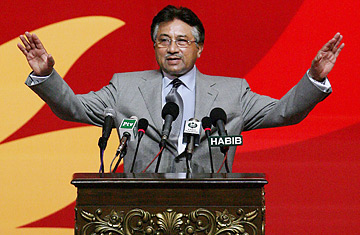
Pervez Musharraf
Pakistan's Supreme Court ruled Friday that General Pervez Musharraf can run for another five-year term as President, dismissing three legal challenges brought by opposition parties. The six-to-three decision in favor of the military leader was met with a stunned silence that seemed to suck the air out of the packed courtroom, before a massive chorus of "shame" echoed through the building's marble halls.
Presiding Judge Rana Bhagwandas's announcement that the petitions were "non-maintainable" means that Musharraf will be a candidate on October 6 when the legislature elects a President, despite his remaining in command of the army. (The constitutionality of his continuing to hold both positions had been the basis of the legal challenges to his running for a second term.) Lawyers who only two months ago had been celebrating the Supreme Court justices for standing up to Musharraf by reversing his dismissal of the popular and independent Chief Justice Iftikhar Chaudhry — who did not preside in this case — denounced the ruling as "despicable."
"This was not an independent decision," says Shaukat Siddiqi, a high court lawyer. "The Supreme Court has maintained the legitimacy of the dictatorship."
Outside the Supreme Court building hundreds of protestors, flanked by just as many riot police, denounced Musharraf and the ruling. Members of one of Pakistan's religious parties hoisted a coffin on their shoulders emblazoned with the word JUSTICE and SUPREME COURT. "This coffin is a symbol of the death of the Supreme Court," explains Khalid Abbasi, a telecoms engineer from Islamabad. "Justice has died in Pakistan today."
But not all were dismayed by the decision. Some lawyers at the court expressed relief, explaining that while a decision against Musharraf may have upheld the integrity of the constitution, the consequences for the country could have been devastating. No one knows what Musharraf would have done had the court ruled against him, but rumors were rife that he would declare martial law, suspending basic rights and civilian institutions. "In view of the total political atmosphere in the country, the ruling is good," says Sheikh Zamir Hussain, a High Court Lawyer from nearby Rawalpindi. "A ruling against Musharraf would have led to chaos, and maybe martial law." He took solace in the fact that Musharraf promised last week that once reelected President, he would give up command of the military.
Others see the ruling as a long-term injury to Pakistan's democracy. "What this has done is set a precedent," says lawyer and talk-show host Ayesha Tammy Haq. "It means that from now on we can always have a military leader running for the office of President." Pakistan has, in fact, been ruled by successive military governments for most of the past 60 years. Pakistan's black-suited lawyers, united by a demand for rule of law, have lead a national campaign for the restoration of democracy that has proved far stronger than any opposition party. "The political parties have fractured over mud-slinging and power games," says 22-year-old university student Alia Amir Ali, outside the Supreme Court. "The only people left with any credibility are the lawyers. They are the only ones taking a stand, and they will win in the end." The court decision was a setback, she says, but she has not lost hope.
Munir Malik, President of the Supreme Court Bar Association, said that the court decision was "academic." On Thursday, a group of lawyers lead by Malik submitted nomination papers for their own presidential candidate, former Supreme Court Justice Wajihudin Ahmed. With less than nine days to campaign and a non-existent budget, Ahmed has no chance of actually winning the election, but that is beside the point. Malik intends to bring a new case to the Supreme Court next week charging that Musharraf's candidacy, proscribed by the constitution because he already holds military office, infringes on Ahemd's right to a fair election. "We will come back for a second round to argue on his behalf that the election is fraudulent," says Malik. "This is but one battle. We will still win the war."
